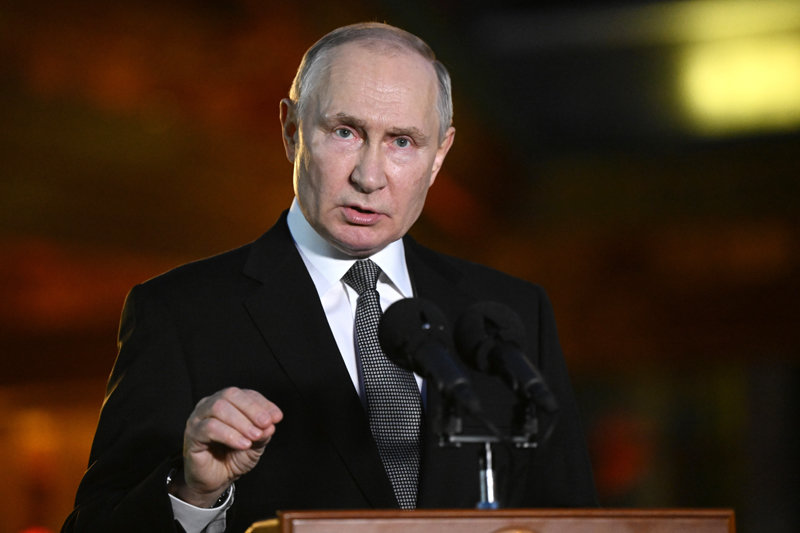Zelensky: If martial law is lifted, the counteroffensive will be weakened.
‘Support for Ukraine’ West says, “Elections must be held”
‘80% approval rating’ Putin welcomes wartime presidential election
If elected, he will remain in power until 2030.
Russia and Ukraine, which have been at war for over 20 months since February of last year, are approaching the presidential election in March next year, but are showing completely different trends.
Although presidential elections are a symbol of democracy, President Volodymyr Zelensky (45), who appeals to the world to “protect the democratic country,” has formalized the policy of ‘no wartime presidential elections.’ This is because martial law must be lifted in order to hold elections, which could weaken the counteroffensive against Russia. On the other hand, Russian President Vladimir Putin (71), famous for his authoritarian rule that strictly controls the opposition and the media, is actually welcoming the presidential election. It is interpreted that his intention is to solidify his path to ruling for life by holding a presidential election as quickly as possible to soften criticism of his long-term rule by turning his attention to the ‘external enemy’.
According to the Russian state-run TASS news agency on the 6th, President Zelensky said in a video speech posted on the Telegram channel that day, “I don’t think the current election is timely.” He said that it is irresponsible to treat the election agenda carelessly now that it is a war situation, and said, “Everyone should focus on the national defense agenda. “National institutions should not waste energy or power on anything else,” he said.
President Zelenskyy was elected president for a five-year term on March 31, 2019, and took office in May of the same year. According to the Constitution, presidential election day is the last Sunday of March in the fifth year of the current president’s term. In other words, the presidential election should be held on March 31st of next year, but it has clearly indicated that it will be postponed.
Ukraine imposed martial law after the Russian invasion. To hold an election in this situation, a temporary lifting of martial law is needed for the general election and a law amendment is needed for the presidential election.
In addition, there is a possibility that Russia may encourage division within Ukrainian society by manipulating public opinion through false information and hacking. There are concerns that civilians may be sacrificed if they target polling places in various places. It is not easy for tens of thousands of soldiers deployed on the front lines to vote, and it is also important to note that after the outbreak of war, many people fled to various parts of the world, including the European Union (EU).
However, the West, including the United States, which has been supporting Ukraine with money and weapons, wants elections. The logic is that only if Ukraine upholds democratic procedures and proves President Zelenskyy’s ability to rule will it have a chance of winning the fight against President Putin, who has a strong image of a dictator. Previously, the North Atlantic Treaty Organization (NATO) also demanded ‘democracy-related reforms’ from Ukraine as a condition for membership.
 Russian President Putin
Russian President PutinOn the same day, Reuters and others reported that President Putin had decided to run for the presidential election scheduled for March 24 next year. If he runs for president next year, it will be his fifth attempt. There are also reports that Putin’s closest associates are already preparing for an election campaign.
The prevailing analysis is that for President Putin, the election is likely to be nothing more than a formality. This is because he has complete control over all of Russian society and there is no one who can stand up to him. Reuters reported that his approval rating is close to 80%, so next year’s presidential election is expected to be nothing more than a formality.
If President Putin succeeds in coming back to power with a high approval rating in the presidential election next March, he will be able to spend another six years in power until 2030, when he turns 77. In addition, he appears to be able to solidify his position and influence by quelling domestic and international criticism of the prolonging war, long-term rule, and suppression of opposition. Foreign intelligence authorities analyze that he is on the path to remaining in power for life.
President Putin first came to power in 2000. He handed over the presidency from 2008 to 2012 to his closest associate, Dmitry Medvedev, deputy chairman of the National Security Council, and stepped down as prime minister, but has continued in power since returning in 2012. He is the second longest-ruling leader in Russia, following Joseph Stalin, former Soviet Communist Party secretary general, who ruled from 1922 to 1952.
Paris =
Source: Donga
Mark Jones is a world traveler and journalist for News Rebeat. With a curious mind and a love of adventure, Mark brings a unique perspective to the latest global events and provides in-depth and thought-provoking coverage of the world at large.